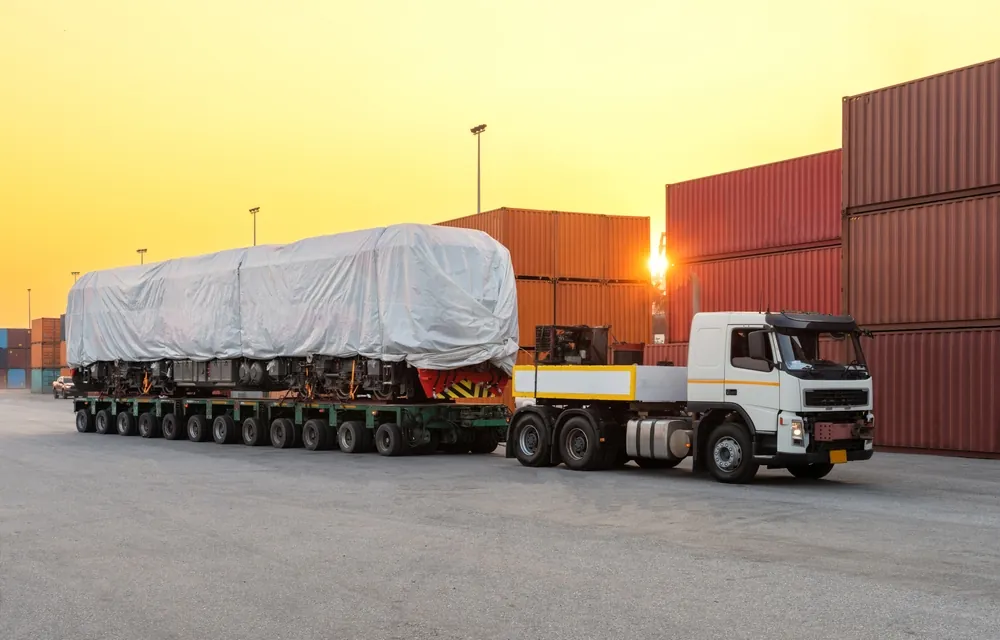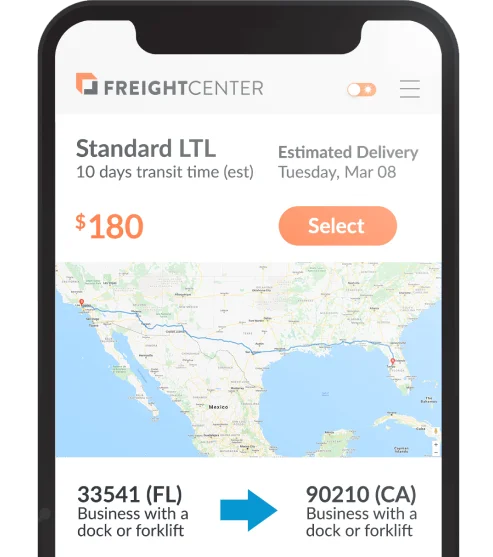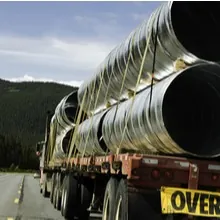
Heavy Haul Shipping: Oversized Freight Transport Made Easy
Expert Heavy Haul Shipping Services for Oversized, Overweight, and Specialized Freight
What is Heavy Haul Shipping?
Heavy haul shipping moves oversized, overweight, and specialized freight that exceeds the legal size and weight limits. FreightCenter provides expert logistics, ensuring safe and efficient transport for construction equipment, industrial machinery, and heavy-duty vehicles. These shipments require specialized solutions like lowboy trailers, step decks, and RGN trailers, along with permits, escorts, and route planning, all of which we handle seamlessly.
What makes FreightCenter the trusted choice? Our nationwide network of certified heavy haul carriers and expert planning ensure your freight moves with the best equipment, safest route, and most cost-effective strategy. With real-time tracking and expert load securement, we simplify even the most complex shipments, delivering end-to-end solutions that get your freight where it needs to be—on time and within budget.
Thousands of businesses trust FreightCenter to move their freight faster, smarter, and cheaper! From unbeatable rates to top-notch service, our customers are raving about their shipping success.
See why they keep coming back!
Award-Winning Service, Trusted by Shippers Everywhere!
- 2021, 2017 & 2016 Food Logistics’ Top Green Providers
- 2021 & 2018 Supply & Demand Chain Executives’ Pros to Know: Matthew Brosious
- 2020 & 2019 Top Food Logistics’ 3PL & Cold Storage Provider Award
- 2020 & 2019 Business Observer’s Top 500 Companies on the Gulf Coast
- 2020 & 2017 SmartWay® Transport Partner
- 2020 & 2017 Food Logistics’ Champions: Rock Stars of the Supply Chain
- 2020 Best of Palm Harbor Awards for Local Businesses
- 2017 Green Supply Chain Award from Supply & Demand Chain Executive
- 2017 Tampa Bay Business Journal Heroes at Work
- 2016, 2015, & 2012 Food Logistics Top 100 Software and Technology Providers
- 2013 Tampa Bay Business 100 by Tampa Bay Business Journal
- 2013 Top 100 Great Supply Chain Partners by SupplyChainBrain
- 2012 TIA Samaritan Award Honorable Mention
- 2012, 2011 & 2010 TBBJ Fast 50 Recipient
- 2013, 2011, & 2010 Diversity Business Top Businesses

Why Choose FreightCenter for Heavy Haul Shipping?
✔ Nationwide & Cross-Border Coverage (U.S., Canada & Mexico)
✔ Full Compliance with DOT & FMCSA Regulations
✔ Custom Solutions – Permits, Escorts & Route Planning
✔ Competitive Rates with Trusted Heavy Haul Carriers
✔ 24/7 Customer Support & Real-Time Tracking
When you choose FreightCenter for your heavy haul shipping needs, you can trust that your cargo will be in good hands and that you’ll receive the best possible service at a competitive rate.
Our Heavy Haul Shipping Process:
Step 1: Get a Quote
Enter your freight details to receive an instant heavy-haul shipping quote.
Step 2: Carrier Selection
We match you with certified heavy haul carriers that meet your specific transport needs.
Step 3: Secure Permits & Escorts
Our logistics team arranges all permits, escorts, and routing to comply with DOT regulations.
Step 4: Safe & Timely Delivery
We ensure on-time delivery with real-time tracking and professional freight handling.
At FreightCenter, we match heavy haul shipments with the right specialized trailer for safe, efficient transport. Our nationwide carrier network handles lowboys, RGNs, step decks, and more, while our logistics experts manage route planning, permits, and securement. With trusted partnerships and regulatory expertise, we ensure seamless, transparent heavy haul shipping every time.
Need to haul bulldozers, excavators, or oversized machinery? FreightCenter’s lowboy trailer solutions provide the clearance needed for tall freight while ensuring safe, compliant transport. Our expert carrier network handles permits, routing, and securement for a seamless delivery.
For oversized machinery, construction materials, or heavy equipment, FreightCenter’s flatbed trailer options offer unmatched versatility. With easy loading from all sides, our certified carriers ensure secure transport, proper permits, and efficient routing for a hassle-free heavy haul shipment.
When your heavy haul shipment is too tall for a standard flatbed, FreightCenter’s step deck trailers provide the perfect solution. Designed for extra height clearance, these trailers ensure safe, legal transport of machinery, vehicles, and industrial equipment, with our expert carriers handling permits, routing, and securement for a smooth delivery.
For extra-tall, heavy haul shipments, FreightCenter’s double drop trailers provide the lowest deck height to safely transport large machinery, industrial equipment, and oversized loads. With built-in well space for taller cargo, our expert carriers handle permits, routing, and securement, ensuring a smooth and compliant delivery every time.
When your heavy haul shipment exceeds standard trailer lengths, FreightCenter’s extendable trailers provide the flexibility needed for long beams, wind turbine blades, and oversized equipment. Our expert carrier network ensures precise routing, permits, and securement, delivering your freight safely and efficiently—no matter the distance.
For ultra-heavy freight that exceeds standard weight limits, FreightCenter’s multi-axle trailers provide the strength and stability needed to transport massive machinery, transformers, and industrial equipment. Our expert logistics team ensures proper axle configurations, routing, and permits, delivering your oversized load safely and compliantly.
For massive, delicate, or uniquely shaped freight, FreightCenter’s Schnabel trailers offer a specialized solution designed to support and secure wind turbine blades, pressure vessels, and large infrastructure components. With a built-in lifting mechanism for added stability, our expert carriers handle route planning, permits, and logistics, ensuring safe and efficient transport.
When standard trailers won’t cut it, FreightCenter’s modular trailers provide a customizable, heavy-duty solution for massive and irregularly shaped freight. Designed for power plants, bridge sections, and industrial machinery, these trailers adjust to your load’s exact needs. Our expert logistics team manages axle configurations, permits, and routing to ensure a safe and compliant transport.


Heavy Haul Shipping Cost Factors
What Affects Heavy Haul Shipping Rates?
Several factors determine the cost of heavy haul shipping, and at FreightCenter, we optimize every shipment to ensure cost efficiency and compliance.
Weight & Dimensions: Oversized freight requires specialized trailers like RGNs, lowboys, or multi-axle trailers, which impact pricing. Our carrier network ensures you get the best match for your load.
Distance & Route Complexity: State regulations, bridge clearances, toll roads, and restricted routes affect cost. Our logistics experts handle the route planning to minimize expenses.
Permits & Escorts: Some states require special permits, escort vehicles, or even police escorts for oversized loads. We manage all compliance paperwork to prevent costly delays.
Seasonal Demand & Fuel Costs: Market fluctuations, fuel prices, and seasonal demand can impact rates. With FreightCenter’s volume discounts, you get competitive pricing year-round.
Need an accurate quote? Use our Instant Quote Tool or speak with a heavy haul expert today!
Heavy Haul Shipping FAQs
Heavy haul shipping comes with unique challenges—oversized freight, special permits, route restrictions, and specialized equipment. At FreightCenter, we simplify the process by handling everything from carrier selection to compliance and securement. Whether you’re shipping construction equipment, industrial machinery, or extra-large cargo, we’ve got you covered.
Below, we’ve answered the most common questions about heavy haul shipping to help you understand the process, costs, and best practices. If you don’t see your question here, our heavy haul experts are always ready to help!
Q. What is heavy haul shipping?
Heavy haul shipping is the transportation of oversized or overweight freight that exceeds standard legal limits for width, height, length, or weight. These shipments require specialized trailers, permits, and route planning. FreightCenter connects you with certified heavy haul carriers to handle the entire process safely and efficiently.
Q. What qualifies as a heavy haul shipment?
A shipment is considered a heavy haul if it exceeds the:
- Width: Over 8.5 feet
- Height: Over 13.5 feet
- Weight: Over 80,000 lbs (Gross Vehicle Weight)
- Length: Over 53 feet
FreightCenter ensures compliance with state and federal regulations, securing the right trailers, permits, and escorts when needed.
Q. How is heavy haul transportation different from regular transportation?
Q. What types of freight require heavy haul shipping?
Common heavy haul shipments include:
- Construction equipment (bulldozers, cranes, excavators)
- Industrial machinery (presses, transformers, turbines)
- Agricultural equipment (tractors, harvesters)
- Aerospace components (aircraft parts, fuselage sections)
- Energy sector freight (wind turbines, generators, oil rig components)
Q. What types of trailers are used for heavy haul shipping?
The right trailer depends on the size, weight, and shape of your freight. FreightCenter provides access to:
- Lowboy trailers – Ideal for tall equipment
- RGN (Removable Gooseneck) trailers – Easy front-loading for heavy freight
- Step deck trailers – Extra clearance for taller loads
- Double drop trailers – Maximum clearance for extreme heights
- Extendable trailers – For extra-long freight
- Multi-axle trailers – Handles ultra-heavy loads
- Schnabel trailers – For specialized infrastructure and wind turbine components
Q. Do I need permits for heavy haul shipping?
Yes. Oversized and overweight loads require permits that vary by state. FreightCenter’s team handles all necessary paperwork, ensuring compliance with DOT and FMCSA regulations so your shipment avoids fines or delays.
Q. When are escort vehicles or police escorts required?
Some states require escort vehicles or police escorts for extremely large or heavy shipments. This depends on:
- Freight width and height
- Route complexity (narrow roads, bridges, and urban areas)
- State regulations
FreightCenter arranges all necessary escorts to ensure safe transport.
Q. How much does heavy haul shipping cost?
Pricing depends on:
- Freight weight & dimensions
- Distance & route complexity
- Permit and escort requirements
- Trailer type needed
- Seasonal demand and fuel costs
Get an instant quote with FreightCenter’s online tool, or speak with a heavy haul expert for a customized shipping solution.
Q. How long does heavy haul shipping take?
Delivery times depend on distance, required permits, and route restrictions. FreightCenter streamlines the process by:
✔ Securing permits in advance
✔ Optimizing route planning
✔ Matching your shipment with the best carrier for faster delivery
For an estimated transit time, request a personalized shipping quote.
Q. Can FreightCenter handle cross-border heavy haul shipping?
Yes! FreightCenter specializes in cross-border heavy haul shipping between the U.S., Canada, and Mexico. We manage:
- Customs clearance
- International permits
- Carrier selection & compliance
Our expertise ensures a seamless border crossing for your oversized freight.
Q. What safety measures are used for heavy haul shipments?
FreightCenter’s certified carriers follow strict securement and safety procedures, including:
✔ Proper tie-downs, chains, and bracing
✔ Load balancing and weight distribution
✔ Route inspections for clearances
✔ Escort vehicles for oversized loads
Every shipment is carefully planned to prevent damage, delays, and safety hazards.
Q. How does FreightCenter choose the right carrier for my heavy haul shipment?
We use our nationwide network of vetted heavy haul carriers to find the best match based on:
- Freight type and dimensions
- Trailer requirements
- Route and permit needs
- Carrier safety and compliance records
With years of experience, FreightCenter ensures you get a trusted, cost-effective carrier.
Q. Can I track my heavy haul shipment in real time?
Yes! FreightCenter provides real-time tracking, so you always know where your freight is. Our logistics team monitors shipments, ensuring:
✔ On-time delivery
✔ Instant status updates
✔ Quick resolution of delays
Contact our freight experts anytime for updates on your shipment’s progress.
Q. What industries rely on FreightCenter for heavy haul shipping?
We serve a wide range of industries, including:
Construction & infrastructure – Cranes, bridges, building materials
Manufacturing & Industrial – Machinery, turbines, transformers
Agriculture & farming – Tractors, combines, irrigation equipment
Energy & Utilities – Wind turbines, generators, oil rig components
Aerospace & Marine – Aircraft parts, ship components
Our heavy haul specialists customize shipping solutions for your industry-specific needs.
Q. What if my heavy haul shipment gets delayed?
Delays can occur due to weather, permit approvals, or road restrictions. FreightCenter proactively minimizes risks by:
✔ Pre-planning routes to avoid common delays
✔ Securing permits ahead of time
✔ Providing real-time shipment tracking
If delays happen, we immediately notify you and work on a fast resolution to keep your freight moving.
Q. How do I get a heavy haul shipping quote with FreightCenter?
Getting a heavy haul quote is easy with FreightCenter:
- Enter freight details into our Instant Quote Tool
- Receive competitive pricing from our carrier network
- Speak with a heavy haul expert for a custom solution
- Book your shipment with full confidence
3 Cool Advantages of Using FreightCenter for Heavy Haul Shipping

Nationwide Carrier Network
FreightCenter gives you access to a vast network of certified heavy haul carriers, ensuring you get the best equipment, routes, and rates for your oversized freight. Whether you need a lowboy, step deck, or multi-axle trailer, we connect you with the most reliable options available.

Expert Route Planning & Compliance
void the headache of permits, escort requirements, and route restrictions! FreightCenter’s logistics experts handle all the paperwork, state regulations, and road clearances, ensuring your shipment moves safely, legally, and without delays.

Cost-Saving Heavy Haul Solutions
Get exclusive volume discounts with FreightCenter’s negotiated carrier rates, saving you money on even the largest, most complex shipments. Our team finds the most efficient transport strategy, so you get top-tier service without breaking the budget.

